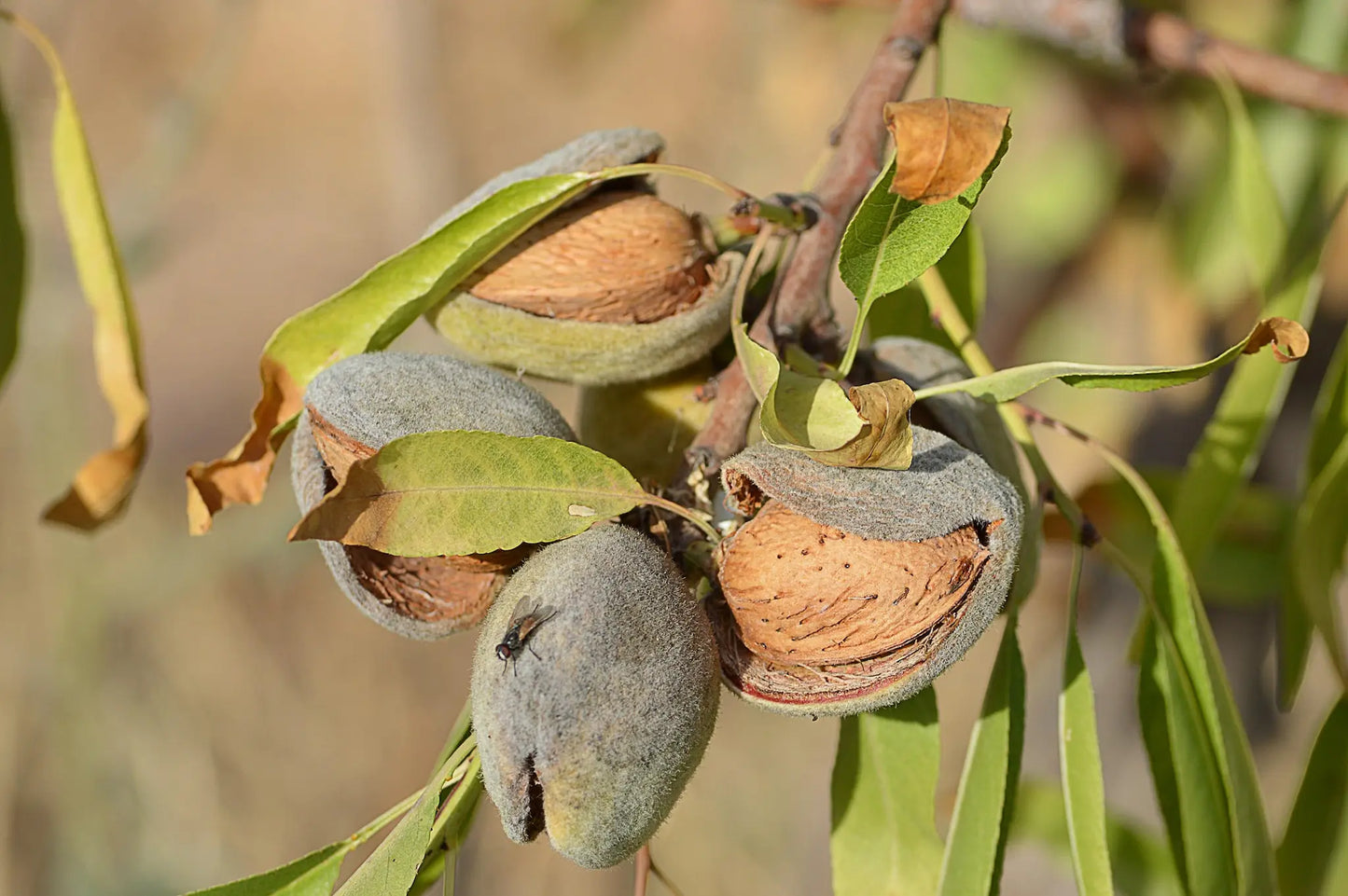-
Delivery from 10 plants to France, Switzerland and Europe
Delivery method -
Almond Tree Wholesale Supplier
About Us -
Quality Almond Tree Plants
Technical itinerary
Almond Tree Sultana Plant Half-Stem Diameter 10-12 cm Bare Root Conventional
Almond Tree Sultana Plant Half-Stem Diameter 10-12 cm Bare Root Conventional
The prices shown are our base prices for large volumes. Depending on the quantity ordered and the producers’ pricing scales, the rate may be adjusted upward. Each quote is personalized to ensure you receive a fair price.
Mini order 10 units / Multiple orders 10 units (FRS202412002)
Couldn't load pickup availability
 Buy now and get it delivered when you're ready to plant - Add your desired date to your quote request
Buy now and get it delivered when you're ready to plant - Add your desired date to your quote request
- Delivery from 10 plants to France, Switzerland and Europe

Collapsible content
FAQ: Planting Tips
You can find all our planting advice for almond trees in France here.
Almond tree - How do I harvest my almonds properly?
Almond tree - How to manage irrigation in France?
Almond tree - What markets for treated almonds?
Almond tree - How to pollinate the almond tree?
Almond Tree - How to Prevent Almond Tree Frost?
Almond Tree - How to ensure good drainage for almond trees?
Almond Tree - How to prepare the soil for 1 hectare of almond trees?
Almond Tree - Which organic fertilizers should you choose for almond trees?
Almond Tree - Annual Work Calendar for the Almond Tree
Planting your almond tree plot: how to do it? What maintenance is required?
Technical sheet of the Sultana Almond variety
- Fruit flesh color: White
- Fruit skin color: Brown
- Size and shape: Medium size, long fruits
- Fruit maturity: Eat green between the end of June and the beginning of July, and dry in September and October
- Fruit taste: Sweet and delicate flavor, sometimes reminiscent of pistachio
- Earliness of the variety: Early flowering (February)
- Fruiting period: September
- Disease resistance and storage: Resistant to cold and fungal diseases such as scab and rust. Fresh almonds can be stored in their shells in a cool, dry place.
- Variety yield: Average productivity
- Is this variety self-fertile? No, it is self-sterile and requires a pollinator (Princess Almond or Marcona)
- Commercial Use: Almonds can be eaten fresh from the end of June or dried, and are used in the making of many desserts and pastries.
- Comments: Requires a hot, dry climate and prefers light, well-drained soils. Often used as an ornamental tree in gardens due to its spring flowering and elegant habit.
Quick read / the essentials on the Sultana Almond tree
The Sultana almond tree is a highly valued variety for its almonds of exceptional taste quality. Native to the Mediterranean basin, it is particularly suited to the climatic conditions of many French regions. Thanks to its delicate and sweet tasting fruits, this variety is very popular in confectionery and pastries. If you are a professional looking to buy Sultana almond plants , it is crucial to choose a trusted partner. Amandiverse , your specialist wholesale supplier of almond plants , supports you in your project with expertise and a wide choice of plants adapted to your terroir.
Sultana almonds are distinguished by their white flesh and brown skin, offering a refined flavor reminiscent of pistachios. This characteristic makes them a high-value product in the dried fruit and premium ingredient market. The tree itself grows with moderate to strong vigor, reaching approximately 5 meters at maturity, and does not systematically require staking. However, to optimize cultivation and ensure good yields, it is essential to meet certain soil and pollination requirements.
Indeed, the Sultana almond tree is self-sterile, which means it must be associated with compatible pollinator varieties such as Princesse or Marcona. In addition, its growth cycle is marked by early flowering in February, which makes it vulnerable to late frosts. Therefore, the choice of planting site is crucial to avoid production losses. For optimal growth, this fruit tree prefers well-drained soils and tolerates drought and calcareous soils well. However, it is sensitive to root asphyxiation and poorly drained soils, which requires special attention to the choice of rootstock.
If you are considering purchasing Sultana Almond plants , please note that Amandiverse , a specialist wholesale supplier of almond plants , offers plants selected for their robustness and their adaptation to different growing conditions. Our experts are available to advise you on the best practices for planting, pollination and climate risk management.
Presentation of the Sultana Almond Tree
The Sultana almond tree is a variety renowned for the exceptional taste of its almonds. Native to the Mediterranean basin, it is cultivated in France and other regions with suitable climatic conditions. This variety is particularly appreciated by growers for its fruit with a mild, sweet flavor, although it has certain growing requirements.
Fruit characteristics
Sultana almonds are distinguished by their white flesh and brown skin. They are medium-sized , elongated, and have a refined flavor, often compared to that of pistachios. Their sweet and aromatic taste makes them a sought-after product in confectionery and pastries.
In terms of preservation, fresh almonds remain intact in their shells when stored in a cool, dry place. Once their shells are removed, they can be stored for one year in the open air without affecting their quality.
Tree characteristics
The Sultana almond tree reaches a mature height of 5 meters and is characterized by a spreading habit and moderate to strong vigor. It does not generally require staking, except when exposed to strong winds or if the arborist wishes to control its height.
Its longevity is significant, being able to reach several decades in good growing conditions.
Vegetative and flowering cycle
The Sultana almond tree is an early variety , with flowering as early as February . This precocity makes it vulnerable to late frosts, which means choosing the growing area carefully to limit climatic risks.
Fruiting begins in June for consumption as green almonds, and dry almonds are harvested between September and October .
Pollination and varietal compatibility
This variety is self-sterile , which means that it requires the presence of other compatible almond trees to ensure good pollination. Recommended pollinators include the Princess and Marcona varieties, which improve fruit set and yield.
Resistance to diseases and climatic conditions
Available information does not specify the exact level of disease resistance of the Sultana almond tree. However, like many almond trees, it can be subject to infections such as brown rot or bacterial canker , as well as aphid attacks. Preventive copper treatments and biological pest control are recommended.
When it comes to pests, it is important to take a preventative approach by removing mummified fruit and diseased branches.
The Sultana almond tree shows good tolerance to drought and calcareous soils , making it an interesting option for arid areas. However, it is susceptible to root asphyxiation and does not tolerate poorly drained soils. A well-filtered soil is therefore essential for its cultivation.
Compatible rootstocks
To optimize its development, the Sultana almond tree can be grafted onto GF677 , an almond-peach hybrid known for its vigor and tolerance to limestone and drought. Another alternative is the myrobalan plum tree , which offers better resistance to root asphyxiation and tolerates heavy soils better.
Economic yield and interest
The productivity of the Sultana almond tree is average, but this weakness is compensated by the superior quality of its almonds . Its mild and slightly sweet flavor allows it to position itself on high-end markets.
Sultana almonds are particularly prized for baking and confectionery , especially for making calissons d'Aix . They can also be eaten raw, offering a much-appreciated crunchy and melting texture.
Tips for growing
In order to optimize the cultivation of the Sultana almond tree, several points must be considered:
- Pollination : It is essential to plant compatible varieties nearby, such as Princess or Marcona , to ensure a good yield.
- Soil and drainage : Well-drained soil is crucial to avoid the risk of root asphyxiation.
- Climate : This variety being early, it is more suited to regions with a mild climate where late frosts are rare.
Prospects for improvement and areas for vigilance
Although the Sultana almond tree is an interesting variety for growers, it would be useful to further develop data on its disease resistance and implement appropriate biological control strategies. Particular attention must also be paid to climate risk management, particularly in the face of late frosts, which can compromise the harvest.
By integrating these elements into an optimized cultivation approach, the Sultana almond tree can constitute a profitable and qualitative choice for professional producers.
To summarize: Sultana Almond
The Sultana almond tree is distinguished by the finesse of its almonds, ideal for processing into high-end products such as calissons and other confectionery. Although its productivity is average, the superior quality of its fruit makes it a preferred choice for demanding producers. Thanks to its good resistance to drought and calcareous soils, this variety can be successfully grown in different regions, provided that good soil drainage and protection against late frosts are ensured.
To maximize yield and ensure stable production, combining with pollinators such as Princess or Marcona is essential. The use of suitable rootstocks, such as GF677 for its vigor and tolerance to dry soils, or myrobalan plum for heavier soils, is also recommended. By incorporating these best practices, growers can optimize their crops and achieve a high-quality harvest.
If you want to buy Sultana Almond plants , turn to a reliable partner like Amandiverse , your specialist wholesale supplier of almond plants . We offer you quality plants, rigorously selected for their performance and their adaptation to the needs of arborists. By choosing Amandiverse , you benefit from expert support, a wide selection of certified plants and a service designed to optimize your investment.
Whether you are an experienced grower or just starting out in almond growing, trust Amandiverse , your specialist wholesale supplier of almond plants , to provide you with robust and productive plants. Contact us today to learn more about our solutions tailored to your project!
-
Almond Tree Plant Sultana Conventional bare-root scion
Regular price €11,50 EURRegular priceUnit price / per -
Organic Almond Tree Plant Sultana Bare-root Scion
Regular price €14,80 EURRegular priceUnit price / per -
Almond Tree Sultana Plant Half-Stem Diameter 8-10 cm Conventional Bare Root
Regular price €24,50 EURRegular priceUnit price / per -
Almond Tree Plant Sultana Half-Stem Diameter 6-8 cm Bare Root Conventional
Regular price €22,50 EURRegular priceUnit price / per



